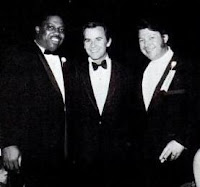This LP was recorded at the A&R Studios in Los Angeles, on 22 & 29 June 1968. Apart from Mildred Lane (lead vcl) and Robert Patterson (piano, organ), the rest of the group reportedly consisted of Mary Stephens, Barbara White and Barbara Appling. Now I'm not about to ascertain this; it is presumably correct anyway. The history of the Patterson group is fraught with difficulties because there were a lot of changes over the years and the group had a long history, going back into the early '50s. As far as I can see nobody ever tried to sort out this mess. What we know is that the Patterson Singers were over in Germany in autumn 1967 and back there again a year later. In 1967, when in Germany, the group consisted of Mildred Lane, Elaine Davis, Everlena Miles, Mary Stephens and Irene Leader; same more or less for the 1968 outfit (there is some confusion about one person being replaced, though; can't go into the details here). In 1970, once again in Germany, we know the group consisted of the same personnel as we have it for the '68 Veep Gospel LP. So a good guess is that in 1968 there was a »U.S.«-group and a »tour«-group, both featuring Miss Lane, and later, around 1970, the U.S.-group took over.
The 1968 Veep LP features eleven songs, and not too much diversity. A number of songs were written by Robert Patterson and they tend to sound, I am sorry to say, much alike. However, there still are several good songs here, and most (not all, because there is at least one song with another female lead singer) are dominated by Mildred Lane's forceful lead vocals. More precisely, they are two songs which bear out Mildred's voice even stronger than the others, and it is these two you can hear in the following. The first tune has a stunning finale; the second tune has her singing in a lower register and, wow!, she's killing me. Happy Sunday all!
The Robert Patterson Singers (feat. Mildred Lane):
»Trouble Don't Last Always« / »I've Been Born Again« from the Veep Gospel LP # 13532 (1968):














.jpg)









